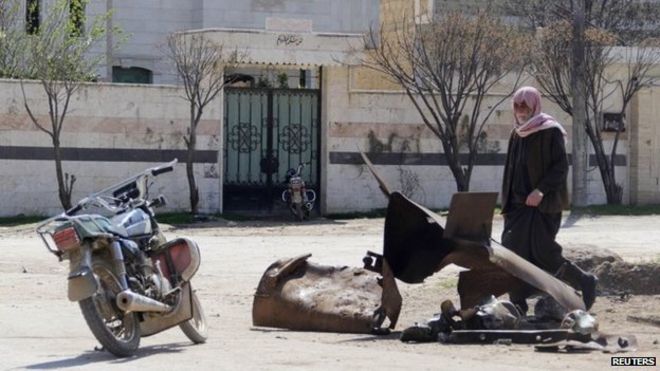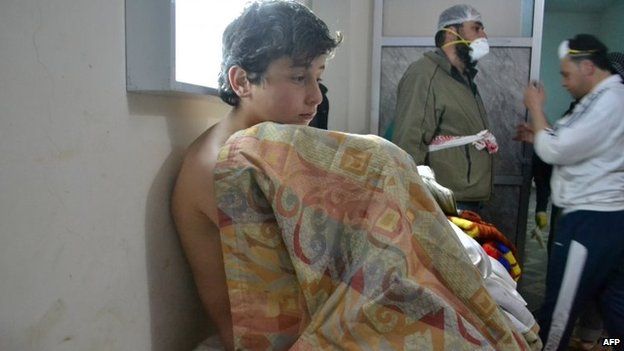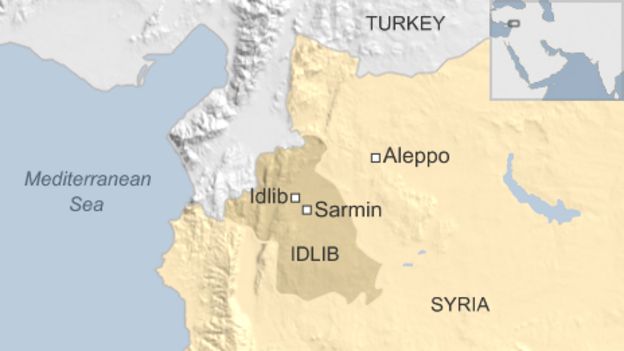- 4 hours ago
- Middle East

Members of the UN Security Council were moved to tears after they were shown a video of an apparent chlorine gas attack in north-west Syria last month.
The footage shows the unsuccessful attempts of doctors to revive three children all aged under four.
US ambassador to the UN Samantha Power described the meeting as "very emotional" and said those responsible will be held accountable.
The Syrian government denies it was responsible for the attack in Idlib.
Syrian doctors, confirming what activists reported after the attack on 16 March, told the UN Security Council that helicopters were heard flying above the village of Sarmin.
There was then a thud and an overpowering smell of bleach before dozens of people began arriving at the local hospital with breathing difficulties.
The video showed the desperate attempts by doctors to revive the three children, aged one, two and three, their grandmother and parents.

Jim Muir, BBC News, Beirut
Chlorine is not a very effective tool. It normally disperses swiftly in open areas, making it of scant use on the battlefield, but it can be fatal if inhaled heavily after exploding in an enclosed space, as appears to have happened in some recent incidents.
The most likely logic for its reported use is as psychological warfare, spreading fear by evoking traumatic memories of the much more serious chemical attacks in 2013.
Assuming the reports are true, there may also be an element of defiance and testing involved. Damascus knows it can count on Russian diplomatic protection unless the outrages are too blatant.
There is also some uncertainty about chlorine's status. It is not in itself designated or banned as a chemical weapon, and bears little relation to sarin or other deadly nerve agents, which Syria has been obliged to destroy or hand over.

Speaking to the BBC, Zaher Sahloul, President of the Syrian American Medical Society, who attended the meeting, said UN delegates were affected by what they saw.
"Some of them were crying. Clearly they were affected by what they have seen in the videos and what they have heard, many of them spoke outside the diplomatic language and many of them have said that this is outrageous and the perpetrators should be brought to justice," he said.
"Many of them suggested that the OPCW [Organization for the Prohibition of Chemical Weapons] should have a prompt and serious investigation."

Samantha Power, who also told reporters "if there was a dry eye in the room I didn't see it", said such testimony was being collected so that those responsible could be held to account.
"The long arm of justice is taking more time than any of us would wish right now, but this documentary record will be used at some point in a court of law," she said.
Activists in Idlib said that the Syrian government dropped five barrel bombs containing chlorine gas on the city on Thursday, while the UN Security Council was meeting.

Known fatal chemical attacks in Syria
- March 2015: Chlorine suspected in attacks on four villages in Idlib province, including Sarmin - six dead, at least 206 people affected
- April/May 2014: OPCW concludes chlorine attacks likely used in attacks on three villages in Idlib - 13 dead
- 21 August 2013: Sarin gas in attacks on two Damascus suburbs - between 200 and 1,400 dead
- 19 March 2013: Sarin gas attack on Aleppo - 19 dead

The attack on Sarmin came just days after the UN Security Council approved a resolution that condemned the use of toxic chemicals such as chlorine in Syria, and threatened military action in case of further violations.
Chlorine is a common industrial chemical, but its use in weapons is banned by the Chemical Weapons Convention (CWC).
The US and other council members have long accused the government of Bashar al-Assad of carrying out chemical weapons attacks.
They say that the Syrian military is the only party to the conflict to have helicopters, which were heard in Sarmin and in other places targeted by chemical attacks.
But Russia, an ally of Syria and a veto-wielding member of the UN Security Council, has always maintained there is insufficient evidence to lay the blame solely with Damascus.


No comments:
Post a Comment